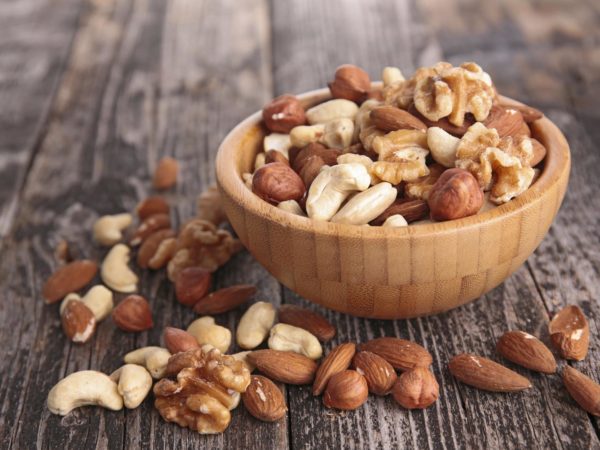Nuts For Nuts?
I know nuts are supposed to be good for you, but I avoid them because they are so high in calories. However, I’ve heard that they’re good for the brain as well as overall health. True? How often should you eat them and in what amounts?
Andrew Weil, M.D. | January 31, 2018

I enjoy nuts, and I’m happy to assure you that they have a firm place in a healthy diet. True, nuts are high in fat, but most contain monounsaturated fat, the kind that is good for the heart. The latest scientific word on the health benefits of nuts comes from researchers at California’s Loma Linda University who found that eating nuts on a regular basis strengthens the brainwave frequencies seen on electroencephalograms (EEGs) that are linked to cognition, healing, learning, and memory.
For the study, volunteers ate almonds, cashews, peanuts, pecans, pistachios and walnuts and then had EEGs to measure the strength of brainwave signals from 9 regions of the brain. The tests showed that certain nuts stimulated some brain frequencies more than others. For instance, pistachios triggered the greatest gamma wave response, which is key to cognitive processing, retaining information, learning, perception and rapid eye movement (REM) sleep. Peanuts, which were included in the study even though they’re legumes, not true nuts, prompted the highest delta response linked to healthy immunity, natural healing, and deep sleep. Study leader Lee Berk, Dr.P.H., M.P.H., said he expects future studies to show that nuts make other healthy contributions to brain and nervous system FUNCTION.
Earlier research from an analysis of 29 studies on nut consumption and disease concluded that eating about 20 grams of nuts daily – about 0.71 ounces or the equivalent of a handful – is associated with a 30 percent reduction in the risk of coronary heart disease, a 15 percent lower risk of cancer and a 22 percent lower risk of premature death.
The researchers, from the UK and Norway, also concluded that eating the same amount of nuts was linked to 50 percent reduced risk of dying from respiratory disease and a 40 percent reduced risk of diabetes. The 29 studies contained data on some 819,000 participants around the world and looked at the consumption of many kinds of tree nuts, including walnuts, almonds, hazelnuts, Brazil nuts, cashews, and pistachios, as well as peanuts. Because these studies were observational in nature, the analysis demonstrated only an association between nut consumption and reduced risk of disease, not a cause-and-effect relationship. However, the report’s co-author, Dagfinn Aune of the School of Public Health at Imperial College London, said the researchers saw a “consistent reduction in risk across many different diseases, which is a strong indication that there is a real underlying relationship between nut consumption and different health outcomes.”
The researchers found no additional health benefits to eating more than 20 grams of nuts daily.
As a complement to their healthy fat profile, nuts provide vitamin E, trace minerals, fiber, and in the case of walnuts, precursors of vital omega-3 fatty acids.
I eat nuts frequently, mostly raw and unsalted. I store them in the refrigerator until I need them. If you like, you can toast nuts yourself by stirring them about in a dry skillet over medium heat. Or spread them on a baking sheet placed in a 350-degree oven; toss them occasionally until they are done. Use up toasted nuts quickly, because their unsaturated oils oxidize quickly on exposure to heat, light and air, creating rancidity. Rancid oils are pro-inflammatory and carcinogenic. Always smell nuts before you eat them or add them to recipes to be sure they are fresh.
As you noted, despite their beneficial nutritional profile, nuts are relatively high in calories, so enjoy them in moderation. I usually eat a handful A day – my favorites are walnuts, cashews, and almonds.
Andrew Weil, M.D.
Sources:
Lee Berk et al, “Nuts and Brain Health: Nuts Increase EEG Power Spectral Density (μV&[sup2]) for Delta Frequency (1–3Hz) and Gamma Frequency (31–40 Hz) Associated with Deep Meditation, Empathy, Healing, as well as Neural Synchronization, Enhanced Cogn. FASEB, 2017
Dagfinn Aune et al, “Nut consumption and risk of cardiovascular disease, total cancer, all-cause and cause-specific mortality: a systematic review and dose-response meta-analysis of prospective studies”. BMC Medicine, December 5, 2016; DOI: 10.1186/s12916-016-0730-3












